| Listing 1 - 10 of 103 | << page >> |
Sort by
|
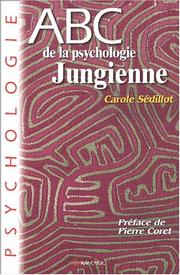
ISBN: 2733907956 9782733907955 Year: 2003 Publisher: Paris: Grancher,
Abstract | Keywords | Export | Availability | Bookmark
 Loading...
Loading...Choose an application
- Reference Manager
- EndNote
- RefWorks (Direct export to RefWorks)
Jung nous a livré très peu d'écrits directement accessibles au public. Cet ABC nous livre les traits les plus saillants et les concepts les plus importants de ses oeuvres. L'accès en est alors facilité pour tous ceux qui veulent l'approfondir.
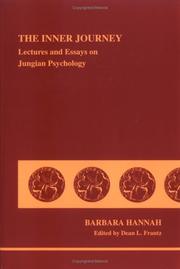
ISBN: 0585117071 9780585117072 0919123899 Year: 2000 Publisher: [Place of publication not identified] Inner City Books
Abstract | Keywords | Export | Availability | Bookmark
 Loading...
Loading...Choose an application
- Reference Manager
- EndNote
- RefWorks (Direct export to RefWorks)
Jungian psychology --- Social Sciences --- Psychology --- Analytic psychology --- Analytical psychology --- Jungian psychoanalysis --- Jungian theory --- Psychoanalysis
Book
ISBN: 0367102013 0429476353 1461957559 1782411283 1781812608 9781781812600 9781782411284 9781461957553 1782200061 9781782200062 9781306410458 1306410452 0429901127 0429915357 Year: 2018 Publisher: Boca Raton, FL : Routledge, an imprint of Taylor and Francis,
Abstract | Keywords | Export | Availability | Bookmark
 Loading...
Loading...Choose an application
- Reference Manager
- EndNote
- RefWorks (Direct export to RefWorks)
This book presents the serial killer as having 'imagopathy' - that is, a disorder of the imagination - manifested through such deficiencies as failure of empathy, rigid fantasies, and unresolved projections. The author argues that this disorder is a form of failed alchemy. His study challenges long-held assumptions that the Jungian concept of individuation is a purely healthful drive. Serial killers are unable to form insight after projecting untenable material onto their victims. Criminal profilers must therefore effect that insight informed by their own reactions to violent crime scene imagery, using what the author asserts is a form of Jung's 'active imagination'. This book posits sexual homicides as irrational shadow images in our rationalistic modern culture. Consequently, profilers bridge conscious and unconscious for the inexorably splintered killer as well as the culture at large.
Jungian psychology. --- Analytic psychology --- Analytical psychology --- Jungian psychoanalysis --- Jungian theory --- Psychoanalysis
Book
ISBN: 0429901097 0367102692 0429476329 1782412956 9781782412953 1322874956 9781322874951 1782201300 9781782201304 9781781814277 1781814279 9781782201304 0429915322 9780429476327 Year: 2015 Publisher: London Karnac Books
Abstract | Keywords | Export | Availability | Bookmark
 Loading...
Loading...Choose an application
- Reference Manager
- EndNote
- RefWorks (Direct export to RefWorks)
Jung and Intuition examines for the first time the twelve categories of intuition described in both the works of C. G. Jung and the post-Jungians. Nowhere, other than in Jung's own work, has intuition been more fully treated. Each form of intuition is critically explained in the historical context of its appearance and located in one of the four spheres of Jung's psychology: the unconscious, the subconscious (Unterbewusste, consciousness, and Jungian and post-Jungian practice. This work brings Jung's entire psychology in all its depth from 1896 to its contemporary use into greater clarity for both professionals and lay readers. The author persuasively shows that intuition is at the heart of Jung's psychology. It is central to his concept of the archetypes as well as to his understanding of the subconscious and the active imagination. It also involves both clinical and philosophical approaches, as powerfully demonstrated by his pioneering work at the Burgholzli Klinik in Zurich.
Jungian psychology. --- Psychoanalysis. --- Psychology --- Psychology, Pathological --- Analytic psychology --- Analytical psychology --- Jungian psychoanalysis --- Jungian theory --- Psychoanalysis
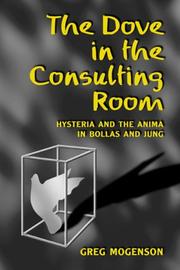
ISBN: 1583912584 1135452571 0203695526 1280032111 9780203695524 9781583912584 9781583912591 1583912592 1583912592 9781135452575 9781280032110 9781135452520 9781135452568 1135452563 Year: 2003 Publisher: Hove, East Sussex ; New York : Brunner-Routledge,
Abstract | Keywords | Export | Availability | Bookmark
 Loading...
Loading...Choose an application
- Reference Manager
- EndNote
- RefWorks (Direct export to RefWorks)
This provocative and original book critically engages with psychoanalysis and in particular the phenomenon of the return of hysteria to analysis, from a Jungian perspective.
Jungian psychology. --- Psychoanalysis. --- Psychology --- Psychology, Pathological --- Analytic psychology --- Analytical psychology --- Jungian psychoanalysis --- Jungian theory --- Psychoanalysis
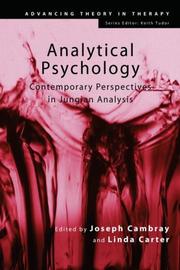
ISBN: 1135443467 1583919988 1135443475 1280053208 0203492048 9780203492048 9781583919989 9781583919996 1583919996 1583919996 9786610053209 6610053200 9781135443467 9781135443474 9781280053207 9781135443429 Year: 2004 Publisher: Hove, East Sussex ; New York : Brunner-Routledge,
Abstract | Keywords | Export | Availability | Bookmark
 Loading...
Loading...Choose an application
- Reference Manager
- EndNote
- RefWorks (Direct export to RefWorks)
The Jungian approach to analysis and psychotherapy has been undergoing an extensive reconsideration during the past decade. Analytical Psychology calls special attention to the areas that have been most impacted: the core concepts and practices of the Jungian tradition, along with relevant intellectual and historical background. Internationally renowned authors drawing on the forefront of advance in neuroscience, evolution, psychoanalysis, and philosophical and historical studies, provide an overview of the most important aspects of these developments. Beginning with a chronicle of the history of the Jungian movement, areas covered include: * a background to the notion of 'archetype' * human development from a Jungian perspective * the creative extension of Jung's theory of psychological types * re-evaluation of traditional Jungian methods of treatment in the light of contemporary scientific findings * Jungian development of transference and countertransference * a new formulation of synchronicity. Analytical Psychology presents a unique opportunity to witness a school of psychotherapy going through a renaissance. Drawing on original insights from its founder, C.G. Jung, this book helps focus and shape the current state of analytical psychology and point to areas for future exploration.
Jungian psychology. --- Analytic psychology --- Analytical psychology --- Jungian psychoanalysis --- Jungian theory --- Psychoanalysis --- Jung, C. G.
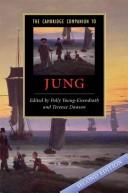
ISBN: 0521685001 0521865999 9780521685009 9780521865999 9781139001847 Year: 2008 Publisher: Cambridge Cambridge University Press
Abstract | Keywords | Export | Availability | Bookmark
 Loading...
Loading...Choose an application
- Reference Manager
- EndNote
- RefWorks (Direct export to RefWorks)
This new edition represents a wide-ranging and up-to-date critical introduction to the psychology of Carl Jung, one of the founders of psychoanalysis. Containing two new essays and thorough revisions of most of the original chapters, it constitutes a radical new assessment of his legacy. The volume also includes a full chronology of Jung's life and work, extensively revised and up-to-date bibliographies, a case study, and a glossary. It is an indispensable reference tool for both students and specialists, written by an international team of Jungian analysts and scholars from various disciplines.
Analytische Psychologie --- Jungian Theory. --- Jungian psychology. --- Psychoanalysis. --- Jung, C. G. --- Jung, Carl G.,
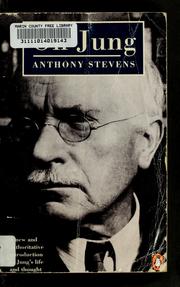
ISBN: 0140124942 9780140124941 Year: 1991 Publisher: London Penguin books
Abstract | Keywords | Export | Availability | Bookmark
 Loading...
Loading...Choose an application
- Reference Manager
- EndNote
- RefWorks (Direct export to RefWorks)
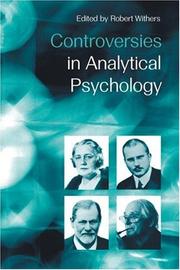
ISBN: 1134570333 0415233054 1280073519 020336127X 9780203361276 9780415233040 0415233046 9780415233057 0415233046 9781134570331 9781134570287 1134570287 9781134570324 1134570325 Year: 2003 Publisher: Hove, East Sussex ; New York : Brunner-Routledge,
Abstract | Keywords | Export | Availability | Bookmark
 Loading...
Loading...Choose an application
- Reference Manager
- EndNote
- RefWorks (Direct export to RefWorks)
How can controversy promote mutual respect in analytical psychology?Analytical psychology is a broad church, and influences areas such as literature, cultural studies, and religion. However, in common with psychoanalysis, there are many different schools of thought and practice which have resulted in divisions within the field. Controversies in Analytical Psychology picks up on these and explores many of the most hotly contested issues in and around analytical psychology.A group of leading international Jungian authors have contributed papers from contrasting perspectives on a
Psychoanalysis. --- Jungian psychology. --- Psychoanalytic counseling. --- Counseling --- Analytic psychology --- Analytical psychology --- Jungian psychoanalysis --- Jungian theory --- Psychoanalysis --- Psychology --- Psychology, Pathological
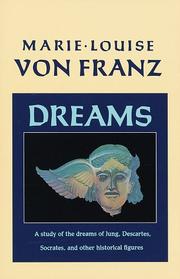
ISBN: 0834829800 1570620350 Year: 1998 Publisher: Boston : Shambhala,
Abstract | Keywords | Export | Availability | Bookmark
 Loading...
Loading...Choose an application
- Reference Manager
- EndNote
- RefWorks (Direct export to RefWorks)
"Carl Jung's must important . . . disciple" offers a fascinating dive into the nature of dreams--revealing what they can teach us about ourselves, others, and even history (Rolling Stone) These collected essays by the distinguished psychoanalyst Marie-Louise von Franz offer fascinating insights into the study of dreams, not only psychologically, but also from historical, religious, and philosophical points of view. In the first two chapters, the author offers general explanations of the nature of dreams and their use in analysis. She examines how dreams can be used in the development of self-knowledge and describes how C. G. Jung worked with his own dreams, and the fateful ways in which they were entwined with the course of his life. The rest of the book records and interprets dreams of historical personages: Socrates, Descartes, Themistocles and Hannibal, and the mothers of Saint Augustine, Saint Bernard of Clairvaux, and Saint Dominic. Connections are revealed between the personal and family histories of the dreamers and individual and collective mores of their times. Dreams includes writings long out of print or never-before-available in English translation.
Jungian psychology. --- Dream interpretation. --- Analysis, Dream --- Dream analysis --- Dreams --- Interpretation, Dream --- Analytic psychology --- Analytical psychology --- Jungian psychoanalysis --- Jungian theory --- Psychoanalysis --- Interpretation --- Dream Interpretation --- Body, Mind & Spirit --- Self-Help
| Listing 1 - 10 of 103 | << page >> |
Sort by
|

 Search
Search Feedback
Feedback About UniCat
About UniCat  Help
Help News
News